A Conversation With Elizabeth Lowell
by Claire E. White
Individually and with co-author/husband Evan, New York Times
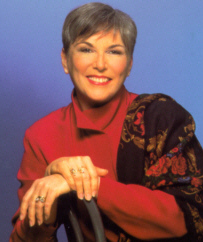
|
Writing as Ann Maxwell (her real name), she began her career in 1975 with a science fiction novel, Change. Since then, seven of her nine science fiction novels have been recommended for the Science Fiction Writers of America Nebula Award; A Dead God Dancing was nominated for what was then called TABA (The American Book Award). Pinnacle recently reissued five of these SF books.
Anne has been married to Evan Maxwell for over 34 years. Evan was a reporter for 20 years, the last 15 of which were spent with the LA Times. In 1976 Ann and Evan (as A. E. Maxwell) collaborated with a Norwegian hunter and photographer, Ivar Ruud, on The Year-Long Day, a nonfiction work that was condensed in Reader's Digest and published in four foreign editions and three book club editions. In 1985, the first A. E. Maxwell crime novel featuring a couple called Fiddler and Fiora was published by Doubleday. The Frog and the Scorpion, received a creative writing award from the University of California. The fourth book in the series, Just Enough Light to Kill, was named by Time magazine as one of the best crime novels of 1988.
Elizabeth and Evan (writing as Ann Maxwell) have published four suspense novels, the most recent of which is Shadows and Silk. These novels appeared on nation-wide bestseller lists. In 1982, Ann began publishing romances as Elizabeth Lowell. Under that name she has received numerous professional awards in the romance field, including a Lifetime Achievement award from the Romance Writers of America (1994). Since July of 1992, she has had 13 romance novels on the New York Times list. Her most recent book is a William Morrow hardcover, Midnight in Ruby Bayou, which is the last book in the immensely popular series which revolves around the Donovan family. Other books in the series are Amber Beach, Jade Island and Pearl Cove. Midnight in Ruby Bayou is a romantic thriller which tells the story of jewelry designer Faith Donovan and her temporary bodyguard, Owen Walker. Owen's job is to guard Faith and a fortune in rubies, but his toughest job may be avoiding falling in love with his charge. Elizabeth's books are known for their deep emotion, fascinating backgrounds (such as the cutthroat ruby trade in Midnight in Ruby Bayou), sizzling love scenes, and her wry sense of humor.
She has a BA in English Literature and a lifelong love of reading. When not writing, she enjoys hiking, salmon fishing, cooking, gardening, and just being on their boat, the Silver Raven. She and Evan have two grown children, Matthew and Heather. She is quite at home on the Internet, and enjoys interacting with her fans on her website. When asked why she writes romantic suspense, she replies, "I write what I know. I have been married to the only man I've ever loved coming up on 34 years now. And it just keeps getting better. I like to write about the ability of love to both heal and create, so I simply combine that with my other interests, gems, culture, politics and history, and I end up with romantic suspense."
Elizabeth spoke with us about her new bestseller, Midnight in Ruby Bayou, how she creates her compelling characters, and what she believes are the secrets to a successful marriage.
What led up to your first book, Change, being published in 1975? What prompted you to start writing professionally?
I think I'll take these the way they happened to me, which is in reverse order. Earlier in our marriage, Evan was a reporter, which meant two things: rotten hours and pretty bad pay. We lived in the suburbs, had a son who was 15 months old, and I was pregnant. Evan worked 4:00 PM to midnight and our son woke up at dawn and never took a nap. Evan needed the car for his work, the bus route hadn't heard of anything within two miles of our house, and I had read all my favorite science fiction authors from back to front several times. There was no money for new books, no books I hadn't read in the public library (when I could get there), and no chance of anything changing in the near future except my waistline.
Television bored me. I was going nuts. So I sat down at the old manual typewriter that had seen two generations through college and started to write the kind of science fiction book I would enjoy reading. At the time, I didn't know any fiction writers. I'd never taken a class in novel writing. I simply began with chapter one and kept going until the end.
By the time I finished our daughter was born. I sent the manuscript "over the transom" to various publishers. It took nine months and three separate pub meetings for the first rejection. The next two weren't much faster. I found a literary agent, handed the manuscript to him, and had a second novel finished by the time the first sold. The first book was called Change, and it came within one vote of being a Nebula Award finalist. At the time, I was too naïve to realize how unusual any of this was. A few years ago, Change was reprinted by Zebra. But don't look for it on any bookstore shelf. It's out of print again.
You didn't turn to writing romance until 1983; how did your first romance novel come about?
Actually, I led a deprived childhood; I was raised on the classics. I was in college before someone introduced me to science fiction. I didn't even know romance books existed until much later. About five books into my science fiction career, the first dedicated word processor hit the marketplace. We bought one. It was like flying. Instead of typing, hand correcting, retyping a clean page to see how it flowed, correcting the page again, retyping it again, etc. etc., I was able see a clean page instantly. The time I spent actually creating as opposed to editing doubled and then tripled, but I wasn't spending any more hours at my work than before. Soon I was ahead of my contract and looking around for something I could enjoy writing just as much as science fiction but would pay better. That year the ABA was in Anaheim, only a few miles from our home. Evan and I were writing mysteries together (as A. E. Maxwell), but mysteries at that point weren't stellar profit centers either. We met our agents, asked what the marketplace was hungry for, and were told Ludlum-type thrillers, romance, and horror.
While Evan checked out the thriller possibilities, I took a look at two entirely new genres: romance and horror. I quickly decided that horror wasn't something I would enjoy writing. Evan collected a second round of five romances at the convention for me (the original batch was swiped the first time he set the books down to get a cup of coffee). The books he gave me were five Silhouette novels. Three of them were from the new line Silhouette was launching, Desire. I read four of the novels and didn't feel much of a tug. The books were certainly as well-written as any other genre out there, but they didn't make me want to write romance. Then I read Corporate Affair by Stephanie James (a.k.a. Jayne Ann Krentz). I was hooked. The story was intelligently written, fast paced, sexy, and featured people I cared about. Since I hadn't previously read romance, I read fifty or sixty category books before I submitted an outline and three chapters to Silhouette. That book, Summer Thunder, was the debut of the Elizabeth Lowell pseudonym. After that, I didn't look back. I loved being able to include a relationship in my books, because at that time the idea of a man and a woman working together was unexpected and/or unwelcome in thrillers, mysteries, and science fiction.
I'd like to talk about your new hardcover release, Midnight in Ruby Bayou. What was your inspiration for this story?
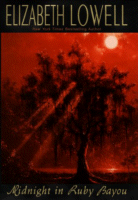
|
One of the major characters in Midnight in Ruby Bayou, Owen Walker, was introduced briefly in Jade Island. I decided then and there that this soft-smiling, slow-talking, supposedly shy Southern boy needed his own book. It was just a matter of coming up with the right story. That took a few years, but I wouldn't have rushed a minute of it. Walker was worth the wait.
Faith Donovan is a fascinating heroine. She's been really burned before in the romance department, and brings a lot of baggage to a new relationship. What was the greatest challenge you faced in writing Faith?
Faith was a wonderful character to work with. She was a smart woman who had made a really dumb choice in a relationship because she felt lonely and left behind after her twin married. Like most people, admitting that she had made a mistake came hard to her; not because she was afraid of looking foolish, but because admitting the mistake meant (to her) that she couldn't trust her own judgment about men in the same way in the future. Then, along comes Walker, with his own baggage and doubts. How they work out their individual and mutual problems -- while simultaneously staying alive and solving the dangerous enigma of the Heart of Midnight -- is, of course, the story of Midnight in Ruby Bayou.
Owen Walker has a different background from the Donovan brothers featured in Pearl Cove and Jade Island; he doesn't have access to the rich family life that they do, for one thing. How did you approach writing Owen?
I wrote Walker the same way I write every major character. First, I create a
| "[L]ove is a beginning to a good marriage, not a guarantee of one. Both people really have to want the marriage to work. One person's desire simply isn't enough to make a marriage viable. Second, both of you must understand that you argue not to win, but to resolve. In a marriage, if one person wins, both of you lose. Keeping score is a certain way to lose first love, then the marriage." |
You have published many novels under the name, A.E. Maxwell, writing with your husband, Evan. How does the collaborative process work for you? How did you divide up the writing itself?
If it's a mystery, Evan usually chooses the backdrop of the stories we write together. Once the backdrop is researched, we sit down and create characters. Then comes the plot. When the story line is pretty well nailed down, Evan goes off and begins writing while I work on Elizabeth Lowell books. If he has any character questions during the writing, we'll talk about it. If he wants to change a major aspect of the story line, we'll talk. (Did you know that talk is another word for argue?)
When he has a first draft done, he dumps it on my computer and walks away. We learned on our first book that it would be a very short collaboration (not to mention marriage!) if he questioned every change and compared each word of first and second draft. As I put it years ago, he asked me to be a collaborator, not an editor. I have complete freedom to make any changes I think will be beneficial for clarity, pacing, dialogue, and characterization. When I'm done, he reads through my work with the same freedom I had with his. Then I go over the manuscript once more, making certain that there aren't any breaks in style or continuity. Then it goes to the editor.
What is the most challenging aspect about team writing?
The most challenging part of collaboration is putting your ego on hold and looking at what is on the page rather than who put it there. The only question that should be permitted in a collaboration is: Does it work as a piece of writing?
Evan and I collaborate not because we can't write alone -- we can and continue to do so -- but because together we can create something neither one of us could create alone. In that, it reflects our marriage. For that reason, I can't imagine collaborating with anyone else. The process is simply too intimate.
What is your advice to aspiring novelists?
Never give up.
What do you love most about writing contemporary romances?
Contemporary romantic suspense gives me an opportunity to combine my favorite storytelling elements: a man, a woman, danger, mystery, and resolution. In a pure romance, the developing relationship is the plot; romances are entirely character driven novels. In romantic suspense, the relationship doesn't drive the plot, the mystery does. The challenge, and the pleasure, of writing romantic suspense comes in making revelations of fact and the developing relationship combine to propel the story. Protagonists who can't/won't trust each other won't be able to solve the mystery. With each increase in mutual trust, more of the mystery can be solved. When you add objects of great value or cultural significance to the mix, you have the kind of romantic suspense I really enjoy writing.
Your books have such wonderful, detailed settings. How do you go about picking the location for a new book, such as the great Southern locations in Midnight in Ruby Bayou?
I have always loved wild lands more than cities, so my first choice of setting is a place where the cities (the home of so much wealth and culture) are close to unfenced lands (the home of my soul). Cities of the West are like that, which is why the majority of my books have been set somewhere west of the Rocky Mountains. Yet there are free and wild places everywhere, including east of the Mississippi. They're just harder to find. The South has many of those places, plus the kind of steamy summer climate that makes every day an adventure in survival, and the mild, dreamy winter climate that makes everyone who doesn't have it envious.
After I decided to set Midnight in Ruby Bayou in the South, I wanted to find a place that had old history, new money, and the kind of land that alligators love. Hilton Head was the perfect backdrop. Evan and I spent a chunk of winter there, plus trips at other times of the year. While we were there, we hiked, kayaked, played tourist, drove on every back road we could find, bought regional books by the carton, and took hundreds of pictures. When I finally sat down to write Midnight in Ruby Bayou, I had all the tangible items -- books, photos, notes, etc. -- plus the more intangible memory of the feel of the sun and the taste of the air. I used these things not to recreate the South I had seen, but to create a fictional piece of that South. Thus, the plantation house I describe in Midnight in Ruby Bayou isn't taken from a specific house in a specific place; rather, the house is something that could have been built but exists only in my own mind. The same is true of the area surrounding the house; nothing in the book is impossible given the natural and social history of the South, but everything in the book is the result of my using facts to create a convincing fiction.
The grand part of it all is when southerners write and tell me they didn't know I lived there, and they know just which plantation house I used in my book. That tells me I caught the flavor of a very special place.
Your recent books have given readers such wonderful glimpses into the world of fine gemstones. Pearl Cove (which is just out in paperback) was especially fascinating with the lore and allure of pearls. Have you always been a lover of fine gems? What is your favorite gemstone?
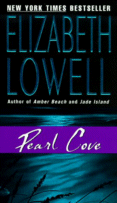
|
I'd like to talk about the details of the creative process for you. What is a typical writing day for you like?
A typical writing day...if only there were such a thing. Okay. On a mythical typical writing day I get up, exercise, eat breakfast, shower, reread the eight pages I did the previous day, write four more, eat lunch, write another four, cook dinner, begin/continue research for the next book, go to bed, sleep, get up...repeat until book is finished. My actual writing day is more like "Will somebody please kill the @%#$!# phone before I rip it out of the wall?" (Often yelled before I get out of bed.) Exercise interrupted by ringing phone. Breakfast, same. Go to computer. Write/answer email from agent/publisher/other professionals. Answer questions on my elizabethlowell.com website. Answer more email. Answer phone. Work on interviews such as this. Edit the few miserable pages I managed to squeeze in the day before. Eat lunch. Ignore phone. Sit down to write. Yank phone plug out of wall. Write as much as I can before the world catches up with me again. Cook dinner. Research or zone in chair, depending on how bad the day was. At unexpected intervals there are always line-edited manuscripts to go over. Copy-edited manuscripts to go over. Page proofs to proofread. Cover copy to deal with. Royalty statements to scrutinize. Did I mention all the normal domestic crises? Yeah, I have them. Go to bed. Sleep. Get up. Repeat until book is finished. Writer's block? Forget it. A deadline is a great inspiration, as Charles Dickens proved.
What do you think about Stephen King's decision to publish The Plant in serial form on the Internet, with people paying $1.00 per download, on the honor system, with no publisher involvement at all. (So far, 75% of the readers have paid up.)
| "When there were inevitable conflicts (usually around deadline time), I simply asked myself, 'Am I going to go to my grave regretting not doing A or B or C or Z? Which is more important to me?' ... The older you get, the more you learn that your priorities don't really change. Family comes first. People come first. Writing comes at night." |
What do you look for when you go to pick up a book to read? What makes a truly great romantic novel to you?
I don't separate my requirements for a good romance novel versus a good any-other-label novel. If the writer's voice and characters don't compel me, I'll put a book down and never pick it up again, no matter if it is science fiction, romance, suspense, or any other of the divisions marketers love to make in fiction. I know that in real life bad things happen to good, bad, or merely boring people; I don't find immersing myself in those fractured lives an entertainment in reality or in fiction. I also know that good things happen in life; in my reading, as in my writing, I prefer to celebrate the possibility of joy rather than delineate the futility of modern life.
One of the greatest challenges facing women today is trying to accomplish more than ever in a limited amount of time, and having to play many roles in life: businesswoman, mother, wife and friend. You are so prolific in your writing, yet have also managed to have a full and satisfying family life as well. How do you juggle all the demands on your time? Do you set certain priorities in your life?
Yes, I set priorities. Otherwise I would be stressed out and overwhelmed. (Some days I am anyway!) How do I set my priorities when all things seem equally important and/or urgent? While our children were living at home, their needs came first. After all, they didn't ask to be born. We asked for them. For me, that meant writing part-time around the kids' schedules. As long as Evan worked outside the home as a reporter, the majority of the parenting demands fell on me. Once he quit, we shared the demands of parenting, which allowed me to write full time. When there were inevitable conflicts (usually around deadline time), I simply asked myself, "Am I going to go to my grave regretting not doing A or B or C or Z? Which is more important to me?" A sick child is more important than a deadline. The child will get well with the comfort of a parent nearby and the parent will just work longer at night to meet the deadline. The older you get, the more you learn that your priorities don't really change. Family comes first. People come first. Writing comes at night.
You have written in so many genres, from romance to science fiction to mystery. Yet of all the genres, romance seems to get the most criticism as a valid art form, while remaining the most popular genre of books sold in America. Romance novels are well-loved by millions of people, but the literary critics routinely trash the genre -- quite unfairly. Why do you think this is true?
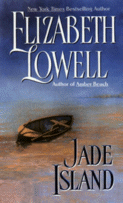
|
Romances, along with much of popular fiction, are anti-modernist. Romances are about the possibility of transcendence in everyday life. They are modern myths told around urban campfires, and the theme of these stories is that anything is possible. Even love.
How conscious of your audience are you when you write?
Not at all, I'm afraid. I'm so caught up in the writing itself that I don't even see the computer screen; I see the characters, hear their voices, share their thoughts and dreams and fears. The idea of readers simply doesn't occur to me.
Your books are so rich in emotion. Do you ever feel drained after a day of writing, or after a novel is finished?
Yes. Always. To both.
What's the secret behind your sizzling love scenes?
I have been asked that question many times. I wish I had an answer. I don't approach writing love scenes any differently than I approach any other action scene in the book. Perhaps it is as simple and elusive as the fact that making love, rather than having sex, is an emotionally complex act. I try to bring that complexity to the page. Let's face it. We all know the mechanics. But what it means to the characters...ah, that is a different scene entirely. A much more intense one.
Tell us about your next book project.
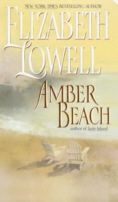
|
You and your husband are a rarity these days, with 34 years of happy marriage. What do you believe are the secrets to a successful marriage?
First, understand that love is a beginning to a good marriage, not a guarantee of one. Both people really have to want the marriage to work. One person's desire simply isn't enough to make a marriage viable. Second, both of you must understand that you argue not to win, but to resolve. In a marriage, if one person wins, both of you lose. Keeping score is a certain way to lose first love, then the marriage. Third, you need mutual respect, which is based on the certainty that both of you can stand alone, but you choose to stand together. This isn't a choice you make only once. It's one you make every day of your married life.
If you were magically given a full week with no deadlines or family responsibilities of any kind, how would you spend it?
With Evan. Fishing in Alaska.
Photo of Elizabeth Lowell by Sigrid Estrada.
Return to the September 2000 issue of The IWJ.
More from Writers Write
